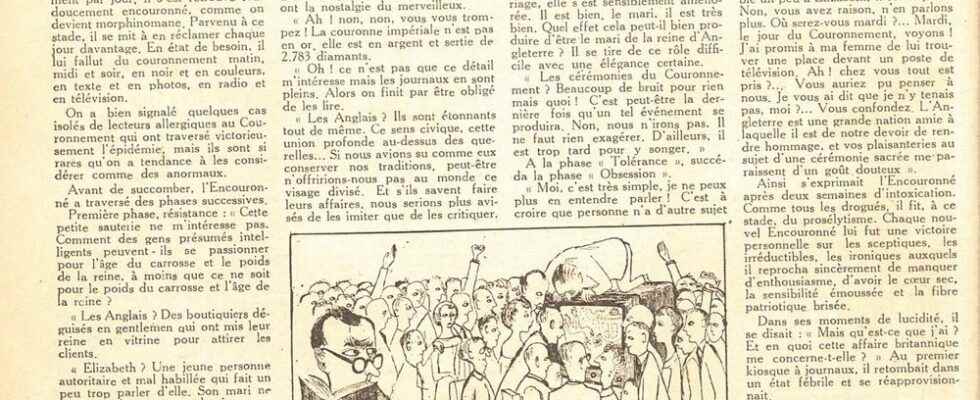On June 2, 1953, the eyes of the whole world were riveted on Westminster Abbey where Elizabeth II was crowned queen at the age of 27. Seventeen days earlier, the first issue of L’Express came off the rotary presses, driven by the dynamism of the newspaper’s founders: Jean-Jacques Servan-Schreiber and Françoise Giroud. For seventy years, our magazine has witnessed the ups and downs of the longest reign in the history of the British monarchy. Through our archives, we invite you to review our most beautiful front pages and browse a selection of articles devoted to Elizabeth II, crowned at the birth of L’Express and died at the dawn of our 70th anniversary.
June 6, 1953 – The Coronation Addict
L’Express was less than three weeks old when Elizabeth II was crowned on June 2, 1953. In a moody note, the newspaper ironically commented on the popular fervor and the media frenzy surrounding the event. “There have been a few isolated cases of coronation-allergic readers who have come through the epidemic victoriously, but they are so rare that they tend to be considered abnormal.”
The coronation of Queen Elizabeth II seen by L’Express.
The Express
Oct. 15, 1955 – Princess Margaret Victim of State Reason
Princess Margaret, younger sister of Elizabeth II, falls in love with Peter Townsend, a divorced Royal Air Force captain and father of two. The queen refuses to give her approval to a possible union. The love story of the sovereign’s sister is sacrificed on the altar of reason of state. Other times, other mores: four decades later, three of the queen’s four children will divorce.
Princess Margaret on the cover of the November 1, 1955 issue.
The Express
Faced with the extent of the media devoted to the sentimental setbacks of a royal princess, Albert Camus is moved in our columns by these two weights, two measures: while a roofing worker has just found death at work, the press and the Opinion has its eyes riveted on the setbacks of the English monarchy.
The Express
July 25, 1986 – Differences with the Iron Lady
Elizabeth II has known fifteen prime ministers, including three women. His relations with Margaret Thatcher, in power from 1979 to 1990, have always been tense, as this 1986 article illustrates.
“That the Queen and her Prime Minister do not bear excessive affection for each other is no mystery to anyone. After all, the British Constitution does not require it. It does, however, set strict limits on the political role of the monarch, invited to practically have no other opinion than that of her government. Officially, the queen can only “be consulted, warn and encourage”. But here she is, according to members – anonymous – of her entourage in full disagreement with Maggie’s policy in all sorts of areas, accusing him of lacking compassion for his most disadvantaged subjects.The prime minister’s intransigence in the endless miners’ strike of 1984-85 made him fear that the social fabric of the country would be damaged for a long time. In fact, it is the whole policy of Margaret Thatcher which, in his eyes, risks undermining the internal political consensus, so beneficial to Great Britain since the end of the Sec World War wave.”
Margaret Thatcher receives applause in October 1989, following a Conservative party conference in Blackpool. To his right, Home Secretary John Hurt, and to his left Foreign Secretary John Major. The latter will succeed him in November 1990, after his forced departure.
AFP
Aug. 21, 1997 – What are kings and queens for?
A week before Lady Di’s death, L’Express devoted its front page to the crowned heads of European monarchies and highlighted the emerging republican current in Great Britain, while saluting Queen Elizabeth’s unwavering sense of duty.
“Never, since Cromwell, has the monarchy seemed so threatened, even during the crisis of 1936 (caused by Edward VIII’s desire to marry Wallis Simpson, a divorcee). Suddenly, the newspapers grew bolder and go to rebellion. “It’s time for the republic”, displayed, the first, like a manifesto, The Independent on SundayFebruary 18, 1996. “The Queen, who has performed her duties admirably, should remain on the throne until her death or abdication. But the question about the republic must be put by referendum and the debate, long kept under the bushel, open,” it read.
Queen Elizabeth II on the cover of n° 2407 dated August 21, 1997.
The Express
December 18, 2019 – Elizabeth II, Britain’s favorite royal
After seventy years of reign, L’Express salutes the sense of duty and the popularity of Elizabeth II who devoted her entire life to the service of the British crown.
“Paradoxically, it was this reserved woman, dreaming of a discreet life in the countryside, surrounded by her family, her dogs and her horses, who succeeded in defining the contours of a modern monarchy. The polls show it: since twenty years, the popularity rate of Elizabeth II exceeds 70%.For the 60th anniversary of her reign, in 2012, 80% of the British voted for their sovereign. Ma’am !”
Elizabeth II, a whole life devoted to the British crown.
The Express
